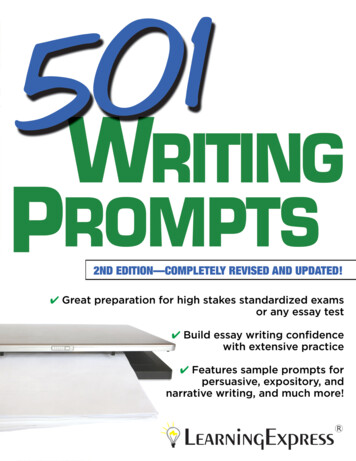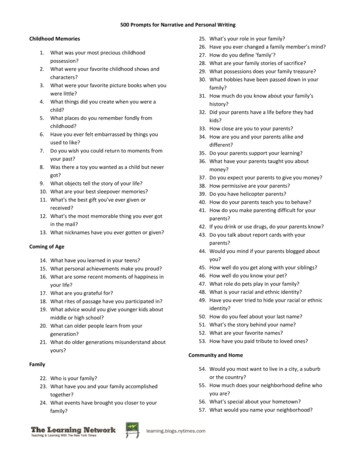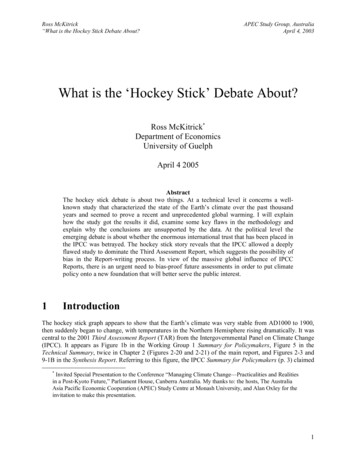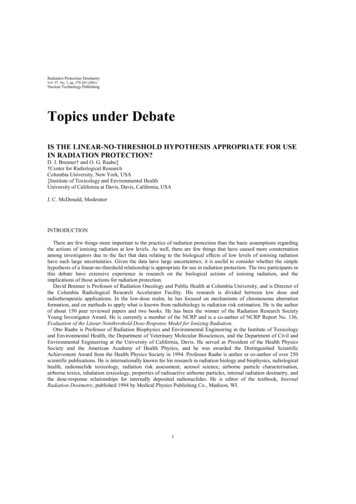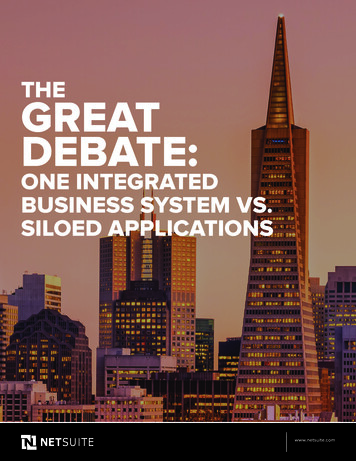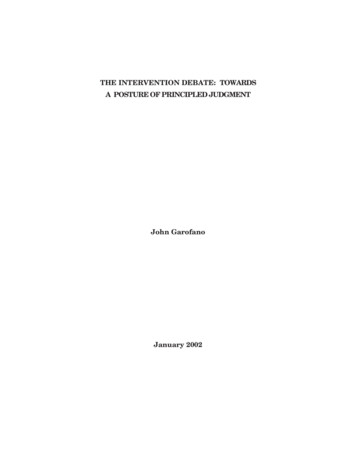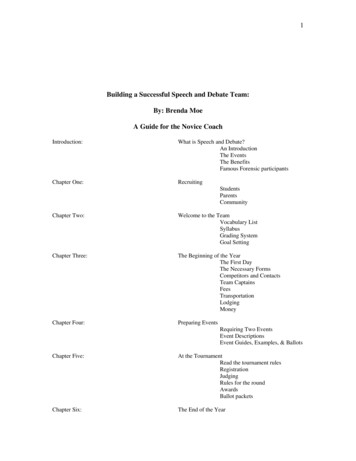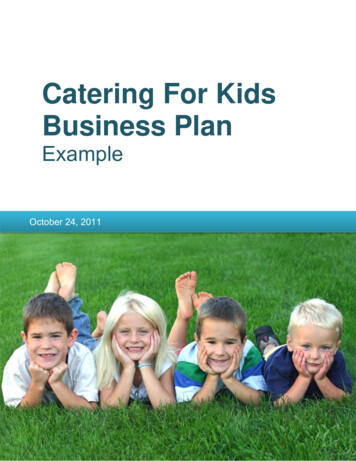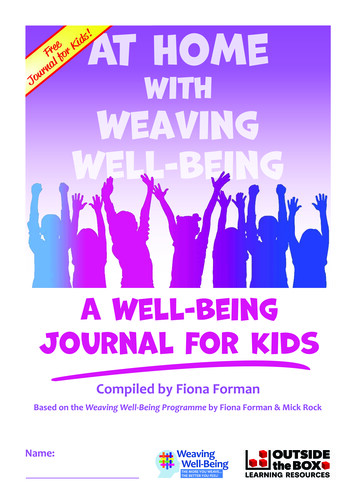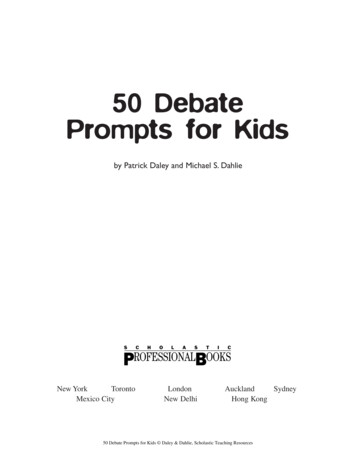
Transcription
50 DebatePrompts for Kidsby Patrick Daley and Michael S. DahlieSCHOLASTICPROFESSIONALBOOKSNew YorkTorontoMexico CityLondonNew DelhiAucklandSydneyHong Kong50 Debate Prompts for Kids Daley & Dahlie, Scholastic Teaching Resources
Scholastic Inc. grants teachers permission to photocopy the designated reproducible pages from this book for classroom use.No other part of this publication may be reproduced in whole or in part, or stored in a retrieval system, or transmitted in anyform or by any means, electronic, mechanical, photocopying, recording, or otherwise, without written permission of thepublisher. For information regarding permission, write to Scholastic Inc., 555 Broadway, New York, NY 10012.Many of the debates in this book have been adapted from Scholastic Action and Scholastic Scope. If you would like to orderclass subscriptions to these magazines, call 1-800-724-6527.Cover design by Josué CastillejaCover illustration by Stacey SchuettInterior design by Daryl HairISBN 0-439-05179-7Copyright 2001 by Patrick Daley and Michael S. Dahlie. All rights reserved. Printed in the U.S.A.50 Debate Prompts for Kids Daley & Dahlie, Scholastic Teaching Resources
Table of ContentsReady, Read, Debate! . . . . . . . . . . . . . . . . . . . . . . . . . . . . . . . . . . 5Using This Book . . . . . . . . . . . . . . . . . . . . . . . . . . . . . . . . . . . . . 7Using Debates to Build Vocabulary . . . . . . . . . . . . . . . . . . . . . . . . 8Graphic Organizers . . . . . . . . . . . . . . . . . . . . . . . . . . . . . . . . . . . 12Debate Prompts1. Should animals be used to test new products? . . . . . . . . . . . . . . . . . 152. Should cell phones and beepers be allowed in class? . . . . . . . . . . . . . 163. In disasters like the sinking of the Titanic,who should be saved first? . . . . . . . . . . . . . . . . . . . . . . . . . . . . . 174. Should beaches have rules? . . . . . . . . . . . . . . . . . . . . . . . . . . . . 185. Should people be allowed to go barefoot anywhere they want?. . . . . . 196. Should gun makers pay the cost of gun violence? . . . . . . . . . . . . . . 207. Should people lose their jobs if it helps the environment? . . . . . . . . . . 218. Should children be allowed to enter beauty pageants? . . . . . . . . . . . . 229. Should student athletes have to get good grades to play sports? . . . . . . 2310. Should coats made with dog fur be against the law? . . . . . . . . . . . . . 2411. Should boxing be banned? . . . . . . . . . . . . . . . . . . . . . . . . . . . . . 2512. Do police belong in schools? . . . . . . . . . . . . . . . . . . . . . . . . . . . 2613. Should hunting be banned as a sport? . . . . . . . . . . . . . . . . . . . . . . 2714. Should students get paid for attending school? . . . . . . . . . . . . . . . . 2815. If you do the crime, should your parents do the time? . . . . . . . . . . . . 2916. Should teen criminals be locked up in adult prisons? . . . . . . . . . . . . 3017. Should you change the way you dress becauseof what other people might think? . . . . . . . . . . . . . . . . . . . . . . . . 3118. Should businesses be forced to deliver to every neighborhood? . . . . . . 3219. Should the government rate music? . . . . . . . . . . . . . . . . . . . . . . . 3320. Are teen juries a good idea? . . . . . . . . . . . . . . . . . . . . . . . . . . . 3421. Is space exploration worth the money we spend on it?. . . . . . . . . . . 3550 Debate Prompts for Kids Daley & Dahlie, Scholastic Teaching Resources
Table of Contents (continued)22. If you find 100, is it yours to keep? . . . . . . . . . . . . . . . . . . . . . . 3623. Some malls in America have banned teens. Is this fair? . . . . . . . . . . . 3724. If you see someone cheating on a test, should you tell? . . . . . . . . . . . 3825. Are teen curfews a good thing?. . . . . . . . . . . . . . . . . . . . . . . . . 3926. Is year-round school a good idea? . . . . . . . . . . . . . . . . . . . . . . . . 4027. Should skateboarding be banned in public places? . . . . . . . . . . . . . . 4128. Should Olympic athletes be tested for drugs? . . . . . . . . . . . . . . . . . 4229. Should sports teams drop Native American names? . . . . . . . . . . . . . 4330. Should celebrities be responsible for the products they endorse? . . . . . . 4431. Should schools have dress codes? . . . . . . . . . . . . . . . . . . . . . . . . 4532. Should celebrities speak out on political issues? . . . . . . . . . . . . . . . 4633. Should kids have to address teachers as Ma’am and Sir? . . . . . . . . . . 4734. Should laws be stricter for teenage drivers? . . . . . . . . . . . . . . . . . . 4835. Should the paparazzi be banned? . . . . . . . . . . . . . . . . . . . . . . . . 4936. Do teens have too much to do?. . . . . . . . . . . . . . . . . . . . . . . . . 5037. If you find a historical treasure, does it belong to you? . . . . . . . . . . . 5138. Should surveillance cameras be used in schools? . . . . . . . . . . . . . . . 5239. Should moshing be allowed at concerts? . . . . . . . . . . . . . . . . . . . . 5340. Should school newspapers be censored? . . . . . . . . . . . . . . . . . . . . 5441. Should paddling be used to punish students? . . . . . . . . . . . . . . . . . 5542. Would you give up certain luxuries to save the environment? . . . . . . . 5643. Should students have to do volunteer work to graduate? . . . . . . . . . . 5744. Should schools named for slave owners be renamed? . . . . . . . . . . . . 5845. Should doctors transplant pigs’ organs into human bodies? . . . . . . . . 5946. Should male and female training in the military be separate? . . . . . . . 6047. Should girls have their own schools? . . . . . . . . . . . . . . . . . . . . . . 6148. Should kids learn riflery in schools? . . . . . . . . . . . . . . . . . . . . . . 6249. Should the United States be the world’s police force?. . . . . . . . . . . 6350. Should teens have their own credit cards? . . . . . . . . . . . . . . . . . . . 6450 Debate Prompts for Kids Daley & Dahlie, Scholastic Teaching Resources
Ready, Read, Debate!Debating teaches students how to investigate new ideas and develop criticalthinking skills, and opens their minds to different viewpoints.Using Debates in the ClassroomOnce considered the stuff of elite high schools, debates are finding their way into classrooms at all grade levels. And for good reason. The debating process teaches studentshow to investigate new ideas, helps them develop critical thinking skills, and opens theirminds to different viewpoints.Basically, when working with students, there are five steps to the debating processthat you will want to reinforce and model. Those steps are as follows:GatherGather informationExploreExplore all sides of an issueFormForm an initial opinionDefendDefend the position in a debateRefineRefine opinion through knowledge gained in the debateNot an ArgumentUnfortunately, many of us confuse debating with arguing. And no wonder! Our mostpublic displays of debate—political debates—are rarely an exchange of ideas for thepurpose of refining one’s thinking. Ideally, debating is an open-minded, intelligent wayto explore a world filled with diverse viewpoints.In the classroom, you can best instruct about this type of debate by regularly modelingit, making sure to demonstrate your willingness to change your opinions as you gathernew information. For a simple debate exercise, you can complete the five-step process inminutes. A more elaborate or complex debate may extend for weeks.50 Debate Prompts for Kids Daley & Dahlie, Scholastic Teaching Resources5
The Reading ConnectionOf course in this book you will find many debates which will spark new ideas and challenge existing viewpoints. But before you even consult the pages in this book, you canhelp students better prepare for debating just by turning to the books they are reading . . .or have read long ago.As a warm-up, bring out the children’s classic, Make Way for Ducklings. (Yes, even yoursophisticated middle-schoolers will see the debating value of this picture book when youare finished.) Read the book aloud to students to refresh their memory of the tale. Thenintroduce the debate question, “Should Mike have stopped the traffic to let the ducklingscross the street?”Instead of having students immediately vote yes or no, focus on exploring the different sides of this question. (NOTE: It is extremely important for you to show that you arealways more interested in the process of forming an opinion than you are in the opinionitself.) Why might someone say that Mike was right? Why might others think he waswrong? Have students revisit the story to seek further information and clarification. Werethere stop signs or traffic lights on the street? How fast were the cars going? Were there,in fact, many cars on the street?Point out to students that they can look to most of the books they are reading independently for good debate questions. And by the middle grades, students are capable of taking each step to a deeper level.Use as an example the book Spirit Quest by Susan Sharpe. In this book, a youngNative American boy discovers more about his rich ancestry. Within the book thereare tons of debatable issues. But a real-world debate topic (which is found later in thisbook) is “Should sports teams drop Native American names?” This debate takes on awhole new significance when viewed through the eyes of William—the protagonist inSpirit Quest.Just ImagineCritical thinking, thoughtful discussion, and informed, flexible opinions. What agreat process to teach students. What a great literacy skill to give our futurecommunity leaders!650 Debate Prompts for Kids Daley & Dahlie, Scholastic Teaching Resources
Using This BookThere are many ways that you can use the debates in this book. Students canread them independently, or you can use them for a whole-class discussion or asshared reading. Here are a few suggestions:Whole-Class DiscussionYou may simply pass out a debate and ask students to read the debate issue—bothsides—and then discuss in class. However, for a richer experience you may want topreview the debate topic by just reading the title aloud. Then students can fill out thefirst part of the Before and After graphic organizer found on page 13. This will allowstudents to see how their opinion might change as they gather more information.Shared ReadingRemember that you, the teacher, are the most valuable resource for modeling how onegoes about forming an opinion. To best do this, pass out a copy of a debate to eachstudent. As you read the debate to the students, use several “think alouds” to show howyour opinion is forming. Interjecting comments such as “Oh, I never thought of that.” Or“That’s something I never thought of before.” This shows that you are an active,engaged reader.Independent and/or Paired ReadingThere are times when you may want your students to work on the debates independently. This option allows students to practice their opinion-forming skills and strategiesfrom time to time. In paired readings students can work together (in pairs) to help eachother through the opinion-forming process. In either case, you may wish to have themexpress their points of view in one or more of the following ways: Discussion: Tell students to be prepared to share their opinion about the topic. Writing: Debates naturally act as prompts for students to craft a written point of view.Encourage students to clearly identify the reasons that have helped them form theirown opinion. Consider Other Viewpoints: A higher-order thinking response occurs when studentsstate the opinion of someone else—not their own. For example, encourage students tothink about what the opinion of the concert organizer might be regarding moshing, orwhat the emergency room doctor’s opinion might be regarding the mandatory skateboard helmet laws. Finding More Information: Some debates will naturally lend themselves to furtherresearch. Assign some debate topics with this task in mind.50 Debate Prompts for Kids Daley & Dahlie, Scholastic Teaching Resources7
Using Debates to Build VocabularyUse this grid to pre-teach difficult words or to follow up on difficult words afterthe debate has been discussed in class.You may also want to assign these words inconjunction with the Learning New Words graphic organizer found on page 12.DebatePromptVocabularyWordsDefinitionadvocate (n.)ethicalvaccinesomeone who strongly supports a causebelieving in and sticking to a value system of right and wronga medicine that protects people from diseasebancommunicatedevice (n.)to not allow somethingto express one’s thoughts through talking, writing, etc.a machine or piece of equipment designed for a specific purposeindestructiblesurvivevoyagesomething that cannot be destroyedto live through a dangerous eventa long journey, typically over a sea or oceandominateinjureruinto control by forceto hurt oneself or anotherto destroy or spoilpromotesoleviolateto spread the word; to encourage others to join inthe underside of the footto break or disregardmisusesueviolenceto use incorrectlyto use legal means to take action against another person or companyacts that are physically harmfulconsequenceenvironmentextinctthe result of an actionthe land, air, and water within a given areawhen all of a particular type of animal or plant dies outcontestantorganizerparticipatea person who takes part in a contesta person who runs or manages a groupto take part incoastdespitestruggleto make it through a situation with little troubleregardless ofto have trouble completing a task or goalwith dog fur beagainst the law?companioncoyoteloyala frienda kind of wild dog that lives in the woodsto stay true or faithful to someone or something11. Should boxing beendurancethe ability to make it through stressful situations—either mental orphysicalthe loss of the ability to move or feel part or all of one’s bodyfascinating and captivating1. Should animals beused to test newprodu
goes about forming an opinion. To best do this, pass out a copy of a debate to each student. As you read the debate to the students, use several “think alouds” to show how your opinion is forming. Interjecting comments such as “Oh, I never thought of that.” Or “That’s something I never thought of before.” This shows that you are an active,
